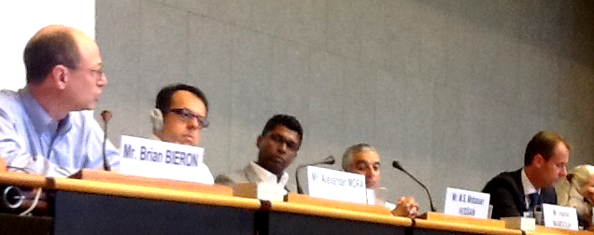
eBay Inc. was invited to participate in a workshop on electronic commerce organised by the World Trade Organisation on 18 June in Geneva. Brian Bieron, heading eBay’s Public Policy Lab, joined a panel together with TecApro of Costa Rica, ZANALA of Bangladesh, ASUS of Chinese Taipei, and Times Internet India. An interesting discussion illustrating today’s universal nature of ideas and practices followed on the panelists’ presentations.
Technology companies around the world are innovating based on methodologies that are becoming universal. Successfully developing services that provide personalized and valued solutions in fast-moving and unpredictable times requires creativity, experimentation and agility. Among the most critical tool for executing on such an approach is big data analytics.
There was indisputable consensus on the importance of ensuring user trust when developing personalized solutions (this white paper by the Centre for Internet Safety contributes to that debate). Nevertheless, the traditional way governments use legislation to achieve data protection and privacy goals was questioned.
No one suggested that innovation should trump regulation or that regulators should step away. The way Bieron formulated the question was like this: what if we applied 21st century data-enhanced models to the regulatory process?
The suggestion is to bring the revolutions in digital technology, data gathering and analysis, and the decision-making models that are transforming nearly all businesses to the regulatory arena. The ambition is a next-generation regulatory model that better serves individuals, companies, innovators and the societal goals that governments aim to achieve (Pay Pal’s recently launched A Smart Step initiative is a concrete contribution to the forming of such a new regulatory model).
The companies on the panel represented providers of online platforms, payments, software, and cloud solutions. Different services but joined around universal innovation methods and each contributing to an emerging borderless and “amorphous” ecosystem that enables economic activity in new shapes and forms.
This ecosystem is presenting an alternative model for small businesses to join the global economy. Micro and small businesses are not required to adapt to global value chains with conditions designed for their much larger counterparts. They can build a global presence on a set of services that can be tweaked to accommodate their needs and resources – Bieron referred to this as the “global empowerment network”.
In sum, two valuable and novel ideas emerged from the panel discussion. First, to apply 21st Century data-enhanced models to “disrupt” regulation in the positive way innovators disrupt other businesses. Second, to foster “global empowerment networks” as offering a flexible and alternative way for micro and small businesses to participate in the global economy.